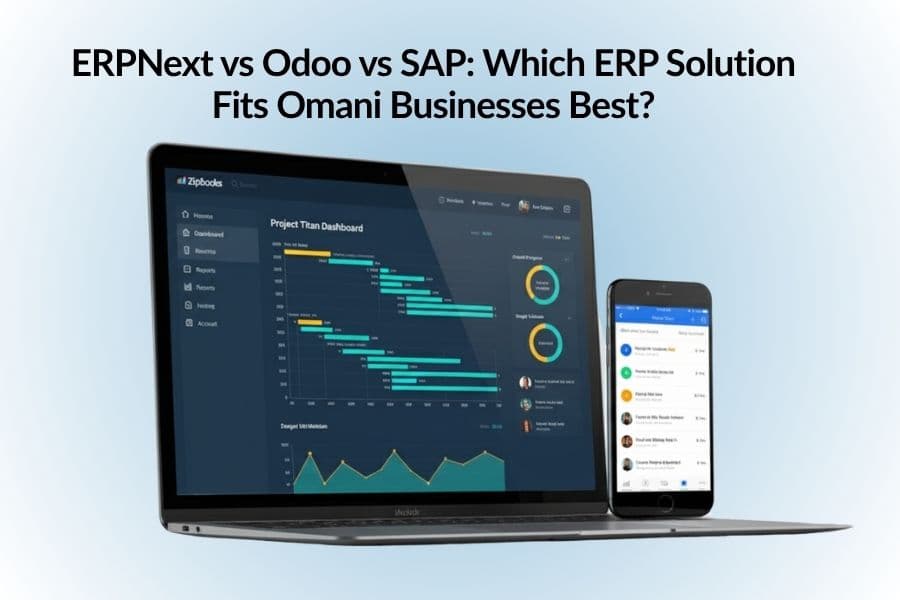
ERPNext vs Odoo vs SAP: Which ERP Solution Fits Omani Businesses Best?
ajinananth
Choosing the right ERP (Enterprise Resource Planning) software is crucial for Omani businesses aiming to streamline operations, enhance productivity, and align with Oman Vision 2040. With leading options like ERPNext, Odoo, and SAP, organizations often struggle to decide which platform offers the best fit for their size, budget, and business goals.
Let’s compare these three ERP solutions based on pricing, scalability, customization, and local suitability for Omani enterprises.
1. ERPNext: The Open-Source Powerhouse
ERPNext is a fully open-source ERP designed for flexibility and cost-efficiency. It’s ideal for small and medium businesses in Oman looking for affordable digital transformation.
Key Features:
- Free and open-source with community or cloud hosting options
- Modules for accounting, HR, CRM, projects, manufacturing, and more
- Easy customization and integration with third-party tools
- User-friendly dashboard and real-time reports
Best For:
Startups, SMEs, and businesses seeking a budget-friendly ERP in Oman with full control over customization.
Pros:
- Affordable and open-source
- Fast deployment
- Highly customizable
Cons:
- Requires technical expertise for setup and maintenance
- Limited enterprise-grade scalability compared to SAP
2. Odoo: The Modular All-Rounder
Odoo offers a unique modular system where businesses can start small and add apps as they grow. It’s popular among Omani SMEs for its flexibility and strong community support.
Key Features:
- 50+ business apps covering every department
- Cloud and on-premise deployment options
- Strong integration between modules (Sales, HR, Inventory, etc.)
- Attractive and intuitive interface
Best For:
Companies in Oman seeking a scalable ERP with smooth integration and good usability.
Pros:
- Flexible modular structure
- Active global community
- Cloud-ready
Cons:
- Paid enterprise edition can be costly
- May require developer support for advanced customization
3. SAP: The Enterprise-Grade Leader
SAP is the global leader in ERP software, known for its powerful features and enterprise-level scalability. It’s widely used by large Omani corporations and government organizations.
Key Features:
- Advanced analytics and AI-driven insights
- End-to-end process automation
- Strong compliance and security features
- Industry-specific modules
Best For:
Large organizations in Oman with complex operations and bigger budgets.
Pros:
- Robust and reliable
- Scalable for multinational operations
- Excellent data management and compliance tools
Cons:
- Expensive for SMEs
- Complex implementation and training requirement
Comparison Table: ERPNext vs Odoo vs SAP
| Feature / ERP | ERPNext | Odoo | SAP |
|---|---|---|---|
| Cost | Low / Open-source | Moderate | High |
| Ease of Use | Easy | Easy | Complex |
| Customization | High | High | Medium |
| Scalability | Medium | High | Very High |
| Target Users | SMEs | SMEs to Mid-sized | Large Enterprises |
| Deployment | Cloud / On-premise | Cloud / On-premise | Cloud / On-premise |
| Support | Community / Paid | Community / Enterprise | Enterprise-grade |
4. Which ERP Solution Fits Omani Businesses Best?
The best ERP solution depends on your company’s size, budget, and operational needs:
- ERPNext – Perfect for small to mid-sized businesses in Oman seeking open-source flexibility and low-cost implementation.
- Odoo – Ideal for growing companies that need modular scalability and modern features.
- SAP – Best suited for large organizations that prioritize advanced analytics, compliance, and enterprise-grade performance.
Conclusion
When selecting between ERPNext, Odoo, and SAP, Omani businesses should consider budget, scalability, and technical expertise.
For SMEs, ERPNext offers excellent value and control.
For flexible modular growth, Odoo stands out.
For large corporations, SAP remains the industry benchmark.
By aligning your ERP choice with your business goals and Oman Vision 2040, you can drive digital transformation and long-term success.